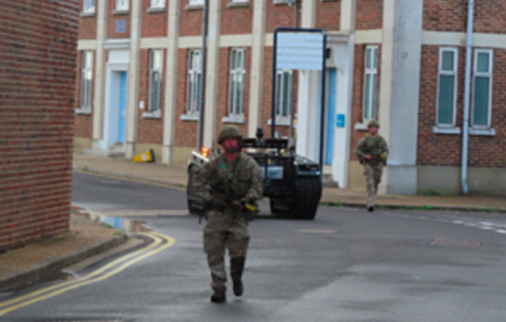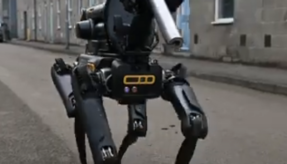
Scientists at Dstl have led a unique urban military experiment, known as the Contested Urban Environment exercise (CUE2021).
During the event international and British scientists and engineers tested technologies that have the potential capability to find enemy forces in built up environments. The novel equipment was assessed alongside a whole host of futuristic technology by military personnel from 1 Intelligence, Surveillance and Reconnaissance Brigade, 1st Battalion The Rifles and 1 Artillery Brigade, in selected areas on the streets of Portsmouth and its Naval Base.
The UK Armed Forces already train for and conduct urban warfare, but this type of experimentation is vital to understand and adapt to the changing warfighting environment. There are many challenges to finding and dealing with threats, such as those experienced when operating in and around dense, tall buildings and within modern urban areas or ‘smart cities’, and with differences of culture and language.
Processor Dame Angela McLean, MOD Chief Adviser said: “It was impressive to see the CUE21 experiment in action – testing this kind of technology is absolutely vital to better equip our Armed Forces. The collaboration with our allies means we are able to share technical knowledge to fight the battles of the future together.”
The Defence Science and Technology Laboratory (Dstl) is at the forefront of testing new technologies collaborated with industry and academia, as well as their ‘5-eyes’ partners: Canada, the USA, New Zealand and Australia. Born out of The Technical Cooperation Programme (TTCP), the 5 partner nations are testing novel technologies that seek to help our forces when operating in urban environments, including:
- highly distributed autonomous sensors that exploit artificial intelligence (AI) and machine learning (ML) to identify threats
- advanced technologies to support intelligence, surveillance and reconnaissance activities on the ground, in the air and at sea
- advanced sensors and technologies for detecting uncrewed air vehicles used in urban environments
- understanding the city environment and the interactions of natural and human systems
- technologies that support soldiers operating in dense urban terrain by supporting navigation, detection of threats
- robotic and autonomous systems to support logistics re-supply to deliver to the frontline
- casualty evacuation and handling optimised for the complexity of an urban environment
The capabilities were tested through a combination of field experimentation and analytical techniques. The field experiment in Portsmouth was based on a scenario which involved particular military capabilities that could be enhanced by science and technology (S&T).
Christopher Briggs, Dstl’s National Lead for CUE, said: “This is an opportunity for science and technology to have a major impact on military capability in urban environments, as well as enhancing our mutual reliance with our closest allies. Current thinking on future conflicts has been used to generate scenarios that show the challenges of operations in city settings against a range of potential enemies.”
The first Contested Urban Environment (CUE) experiment took place in November 2017 in Adelaide, Australia, the second took place in September 2018 in Montreal, Canada, and the most recent event took place in New York City, in the US in July 2019. The technology tested then and during the Portsmouth event could be made available to military personnel by 2025.
image © Crown Copyright
If you would like to join our community and read more articles like this then please click here.







